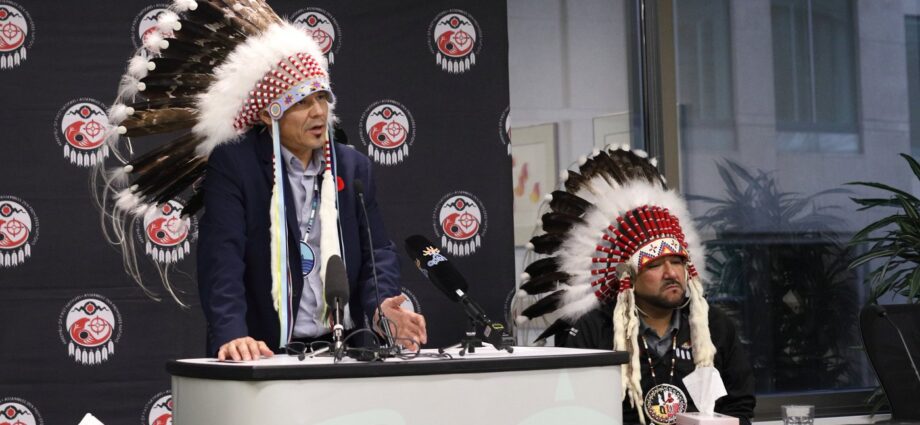
By Sonal Gupta, Local Journalism Initiative Reporter, Canada’s National Observer
November 6, 2025
Indigenous leaders in Alberta say unchecked oilsands development is devastating their land and could be linked to rising cancer rates in their communities.
The leadership is calling on the government to fund independent environmental and health assessments and reject the “treat and release” plan for oilsands tailings until safety can be guaranteed.
“We’re tired of being the guinea pigs of Canada,” said Billy-Joe Tuccaro, chief of the Mikisew Cree First Nation at a press conference on Monday. “If the water isn’t able to be treated and reused in the mines and for development, why is it good enough for us to drink?”
Tuccaro said his community depends on drinking water and fish from Lake Athabasca and the Athabasca River but the water is threatened by 1.4 trillion litres of toxic oilsands tailings stored in massive ponds nearby. The ponds contain harmful substances, including mercury, arsenic, lead, benzene and naphthenic acids that have leaked and contaminated the environment.
Both provincial and federal governments are moving forward with plans — informed by the Alberta Oil Sands Mine Water Steering Committee — to create standards allowing treated tailings discharge into waterways. However, the technology to treat oilsands tailings remains unproven and can’t guarantee safe drinking water, Tuccaro said.
Communities downstream are facing a cancer crisis potentially linked to decades of contamination, he said. Following a 2022 spill of 5.3 million litres of contaminated wastewater — initially dismissed as “discoloured water” — Tuccaro said around 60 people in his community have been diagnosed with cancer over three years. The community is now undergoing health studies to investigate the causes of these cancers, with a strong suspicion that industrial activities on their lands play a central role.
He challenged government and industry leaders: “Come and drink our water, come and shower in it, come and play in the water where our kids swim.”
While solutions exist, the cost of implementing them is outweighing public wellbeing, said Trevor Mercredi, grand chief of Treaty 8 First Nations of Alberta.
This is often the case in the Athabasca region, where development continuously takes precedence over Indigenous peoples’ health, he said. “It’s unacceptable that we have to be here to push and push each and every day through letters, meetings and be ignored.”
While Prime Minister Mark Carney promotes an ambitious plan to fuel economic prosperity by tapping into the province’s vast natural resources, such progress cannot happen without proper solutions and care for people, Mercredi said.
“There has to be a better solution than dumping extremely toxic killing ponds into a lake, a river that is diminishing in size each and every year,” he said.
Tuccaro said his community has sent letters and extended personal invitations to Carney and other leaders to come and see the potential impact of dumping toxic oilsands waste, but those requests have largely been ignored.
Recent meetings with the provincial government on oilsands pollution have yielded little progress, and his community’s warnings are “falling on deaf ears,” Tuccaro told Canada’s National Observer on Monday. He described a worsening health crisis in his community, noting rising cancer rates and other illnesses exacerbated by delayed healthcare access.
“By the time my people are actually seen in an adequate hospital, it’s three or four months behind. And if it’s a severe illness like cancer, they’re coming back home at stage three or four, and sometimes, they’re even coming home in a box, dead,” he said.
Tuccaro told Canada’s National Observer on Monday that he had a brief meeting with federal Indigenous Relations Minister Rebecca Alty that was largely introductory but she had no knowledge of his community’s issues. Although Alty promised a follow-up meeting in Ottawa weeks later, Tuccaro said they were again “being sloughed to the side” with no meaningful response.
Cindy Woodhouse Nanak, national chief of the Assembly of First Nations, urged the government to fulfill election promises and reinstate the First Nations Clean Water Act. “It should have been done by now,” she said at Monday’s press conference.
Alberta chiefs expect the government to provide funding to address the health and environmental crises caused by oilsands tailings, they said.

“We have to work together to come up with some solutions that protect our people,” Tuccaro said. “If the solution is to treat and release the water, you need to do better.”
Subscribe to our newsletter.
With files from Natasha Bulowski
With Sonal Gupta / Local Journalism Initiative / Canada’s National Observer.


